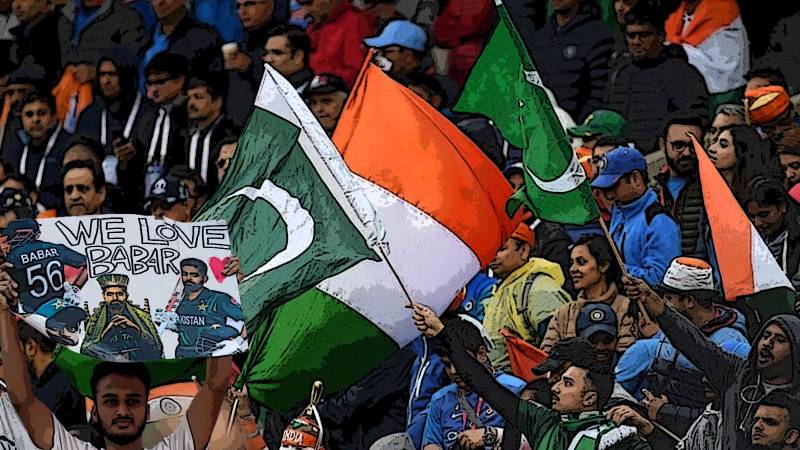
The air was thick with anticipation. The streets echoed with the chatter of cricket. But, inside the huge Narendra Modi Stadium in Ahmedabad, as England played New Zealand on October 5, the empty stands presented an unenthusiastic sight.
Bharatiya Janata Party (BJP) workers came to the rescue. They lured 40,000 women to the match by misinforming them that a match between India and Pakistan was being played. Excited, they left their homes and made a dash for the stadium to watch the two South Asian teams play. Whether they were dismayed to see two English-speaking states play against each other is a story for another time.
The incident nevertheless reflects the unabated enthusiasm among the people for the India-Pakistan match to be played in Ahmedabad on October 14, 2023.
It’s not just the game of cricket that sparks excitement in the subcontinent. It is the emotional national fervour which draws people to the contest. It silences the streets and fills up rooftop restaurants with eager fans. It presents an opportunity for food and beverage companies to make enticing offers and make extra profit. The digital media is also abuzz with hashtags such as #INDvsPAK and #CricketKaMahakaal.
The October 14 match will likely be the most-watched cricket event in history. The Board for Control of Cricket in India (BCCI) has planned a grand opening ceremony. Legendary personalities like Amitabh Bachchan, Rajinikanth and Sachin Tendulkar are expected to attend the event. Popular Indian singer Arijit Singh will be rocking the stadium.
The rush for match tickets was maddening. Narendra Modi Stadium is the largest cricket stadium in the world. It seats over 132,000 spectators. The BCCI closed the ticket window last week. A ticket, originally priced at 2,500 Indian Rupees ($30), fetched as much as 40,000 Indian Rupees ($480) in the black market – until the BCCI reopened ticket sales to end the chaos.
But this time, despite the match being played after a gap of six years, there seems to be no initiative whatsoever from either side. With polls around, a friendly Pakistan does not help the ruling dispensation in India
At the same time, a dark cloud casts a shadow on the politics of India and Pakistan. Chander Shekhar Luthra, a senior sports journalist, says the BCCI welcomed the Pakistan team warmly – with traditional Gujarati music, dancing, fluttering of balloons and showering of flower petals. “This is probably one of the most difficult times for Pakistan to play on the Indian soil, more so in the state of Gujarat.”
Pakistan Cricket Board (PBC) had wanted to play with India in Bengaluru, Hyderabad or Chennai. But the organisers turned down this request.
Since the killing of two army officers and a policeman in Kashmir last month, nationalist voices have called for the boycott of the India-Pakistan match on social media. However, since the arrival of the Pakistan team in Ahmedabad, these self-styled nationalists have suddenly gone quiet. It probably became difficult for them to spray venom against Pakistan after the BCCI, headed by Jay Shah, son of Indian Home Minister Amit Shah and the second most powerful man after Narendra Modi, gave Pakistan a grand welcome.
Elections will be held in five Indian states next month. The BJP’s campaign is based on polarising the Hindu vote and inciting anti-Muslim and anti-Pakistan sentiment among the people. At a time like this, Pakistan’s visit to India swerves against the politics of India.
In December last year, Indian Foreign Minister Subrahmanyam Jaishankar called Pakistan an “epicentre of terrorism”, to which his Pakistani counterpart Bilawal Zardari-Bhutto called Indian Prime Minister Narender Modi the “butcher of Gujarat”, referring to the 2002 Gujarat pogrom when Modi was chief minister of the state. Therefore, to play in Gujarat, that too in a stadium named after him, is a tough call for Pakistan.
“Pakistan team will be playing in a hostile environment. There is no clarity about visas issued to Pakistani fans. The Pakistani journalists were issued visas just ahead of the event. And if Pakistan wins the match, who will dare to celebrate inside the stadium full of hundreds of thousands of Indian fans,” adds Luthra.
Cricket diplomacy has seen its highs and lows. From General Zia’s visit to Jaipur in 1987 to General Musharraf in 2005 and Yusuf Raza Gilani in 2011. Former Indian Prime Minister Atal Bihari Vajpayee had taken a step forward to restore peace with Pakistan and had allowed the Indian team to play a series of matches in Pakistan after a gap of 19 years. But this time, despite the match being played after a gap of six years, there seems to be no initiative whatsoever from either side. With polls around, a friendly Pakistan does not help the ruling dispensation in India, and with Pakistan going through its own political turmoil, quite a few things are amiss this time.
But, diehard cricket lovers are not fanatics. They appreciate a good game -- hopefully, it will not be any different this time.

